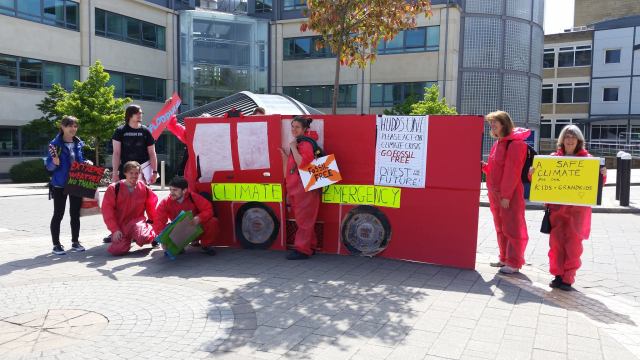This Wednesday 10 May 2017 students and local environmental activists, dressed as firefighters, toured a large scale fire engine around the Huddersfield University campus as part of a ‘Climate Emergency’ action. The action, part of the Global Divestment Mobilisation week, was designed to draw attention to the threat to the students and everyone on the planet from extreme weather and runaway climate change. The campaigners want the University to show decisive action in response to the threat of climate change by committing to go ‘Fossil Free’ and screening all their investments for fossil fuels.
Gareth Savage from the Fossil Free Huddersfield University group said: “It is now widely accepted that the vast majority of fossil fuels need to stay in the ground to stay within the safe climate limits set out in the global Paris Agreement. As an academic institution, with a reputation for scientific excellence, we feel that the University needs to use its position to set a strong example both locally and nationally by joining other UK universities that have already made commitments to drop their fossil fuel investments.”
The Fossil Free Huddersfield University campaign is building support amongst students, staff, alumni and the local community for their divestment call and hopes that the University will very soon follow suit. Gareth added: “The University’s investments in fossil fuels are likely to be relatively small and so asking their fund managers to screen for fossil fuels should not be a big ask. In doing so they would be helping to reduce the social license of the fossil fuel industry, as well as demonstrating their commitment to scientific rigour and the welfare of the students in their care”.
The Climate Emergency action was part of a wave of actions across 42 countries on six continents as part of the Global Divestment Mobilisation, calling on institutions to end their investments in fossil fuel companies responsible for blocking action on climate change. From the 5th – 13th May, hundreds of actions will take place around the world, including over 40 in the UK calling on local government, faith, health, cultural institutions, politicians and banks to show moral leadership and end their support for the fossil fuel industry.
Sign the petition: https://campaigns.gofossilfree.org/petitions/divest-huddersfield-university-from-fossil-fuels
Notes for editors
Fossil Fuel Divestment
The divestment movement saw its beginnings in North America, Europe and Australia and has since become the fastest growing divestment movement in history.
Global commitments to divest have already reached 710 institutions across 76 countries, representing well over US$5.5 trillion in assets under management.
As climate denialists take office and commit to regress on climate action in the face of increased climate impacts worldwide, divestment provides a tangible way for individuals and institutions to show leadership on tackling climate change.
The Global Divestment Mobilisation marks a new turning point for the global fossil fuel divestment movement, which is now spreading in Asia, Latin America and Africa.
In the UK, over 40 events will be taking place as part of the Global Divestment Mobilisation calling on local government, faith, health, cultural institutions, politicians and banks to divest from fossil fuels.

